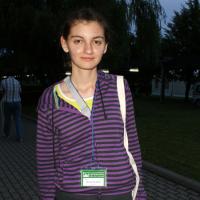Meldinger: 99
Språk: English
DeekuLime (Å vise profilen) 2009 11 22 07:29:46
Maryana (Å vise profilen) 2009 11 22 10:37:57
DeekuLime:Is there any chance that Bryan or Andrew carry over to Esperanto?Andreo for Andrew, and maybe Briano for Brian

Rogir (Å vise profilen) 2009 11 22 13:33:15
Uvi (Å vise profilen) 2009 11 22 18:56:56
ljbookworm:I've noticed that some people translate their names to look more like esperanto. Is this common? And are there any standard translations of anglo names?Well, I do know that famous currency speculator and native Esperanto speaker George Soros (http://en.wikipedia.org/wiki/George_Soros) has a last name which, in Esperanto, means "will soar". There certainly are more like him.
I'm thinking it would be quite cool to have an esperanto name....

By the way, his father, Tivadar Soros, wrote a very interesting book entitled "Maskerado ĉirkaŭ la morto" (Maskerade around death) about how he and his family survived the Fascist invasion of Hungary

erinja (Å vise profilen) 2009 11 22 18:57:03
ljbookworm:Well, it wouldn't be fun to find out your name had some sort of hidden meaning. I kinda like the laŭro option because it's true to my name's original meaning, but also looks really masculine even to me- who did introductory spanish only once a week for one year.Feel free to call yourself Laŭra. No problem with that at all. If my name were Laura, in fact, I would certainly choose Laŭra as my Esperanto name.
For further information, Laura is also an Italian name, and it's pronounced just like the Esperanto Laŭra. I suspect that the Spanish name Laura is also pronounced like Laŭra. Laura is quite an international name, and I think that Laŭra is the translation that best preserves the "look" and the recognizability of the name.
And for what it's worth, Wikipedia also recommends Laŭra: http://eo.wikipedia.org/wiki/La%C5%ADra
Esperanto (Laŭra), Icelandic ("Lára") and Russian ("Лариса" - Larisa) are the only languages on Wikipedia who have the name in any form other than Laura, actually.
ceigered (Å vise profilen) 2009 11 23 07:30:40
JulietAwesome (Å vise profilen) 2009 11 26 19:43:44

paksu (Å vise profilen) 2009 12 2 00:03:42
erinja (Å vise profilen) 2009 12 2 01:40:40
But some people choose to use an "Esperanto name", to use within the Esperanto community. People have different reasons for doing that. Maybe their name is hard to pronounce for people from other countries, so they choose a simplified Esperanto version that is easier for Esperanto speakers. Some people like to make their name fit Esperanto grammatical forms. That means that they will put an -o on their names, so the name can easily accept the -n ending ("Mi vidas Vilĉjon = I see Bill; Vilĉjo = Bill)
Some people feel that their name should be "translated" into whatever language they are speaking. I know a Swiss guy (from a French-speaking region of Switzerland, but born to Italian parents) who called himself Patrick in English, Patrice in French, and Patrizio in Italian. He would be "Patriko" in Esperanto; he simply chose the variant of his name that was most common in each language he spoke.
Some people also like to translate the meaning of their names. You mention the name "Wei Min", which means caring for people; but if you don't speak Chinese, you don't know that the name means anything at all! So some people translate the meaning of their names in Esperanto, so that Esperanto speakers know what their names mean. Therefore, I met a woman who used the name "Bela Lumo" (Beautiful Light) in Esperanto, because that's what her name meant in Korean.
As I said, Esperanto is very free. Just tell people what to call you, and they will call you that. And out of politeness, you will call people what they ask you to call them (even though sometimes it seems like they made a bad choice!)

psilokan (Å vise profilen) 2009 12 4 02:45:39
My given name is Bradley, though I usually go by Brad. I would assume that the shortened form would be come Brado. As for the full version, since Y does not exist in Esperanto I figured I could use the J since it has a similar sound, so I came up with Bradlijo.
Anyone know if this translation is at all accurate?






